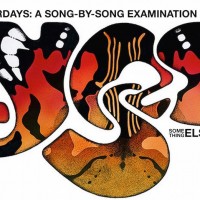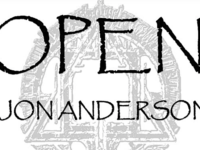Because I was a huge fan of progressive rock back in the 1970s, I believed I was among music’s most enlightened devotees. My love of prog grew from being a fan of Yes, the sub-genre’s most popular and successful band.
It all started with a song that, to this day, remains the biggest prog hit single of all time — “Roundabout,” from their 1972 album, Fragile. The LP version of the song ran for more than eight minutes and was highlighted by Rick Wakeman’s hard-hitting organ solo that he later bettered on “Close to the Edge” from the album of the same name.
After Edge, Yes still produced quality work, and remained popular for years, but they never quite reached the heights of those albums again. Their next release, Tales of Topographic Oceans, was a double-disc set featuring only one long song on each of its four sides and with it, the outfit’s pretentiousness was no longer teetering close to the edge: It fell right over. From there, the band marched on despite an unbelievable number of personnel changes, only occasionally coming close to the heights they achieved in the early 1970s.
My affair with prog-rock has waned somewhat over the years, and my feelings toward Yes along with it, but I still have a lot of room in my heart for their third album, the best one of their career, simply titled The Yes Album. If you only ever buy one Yes record make sure its this little gem from 1971. It’s their first with the fabulous Steve Howe on guitar and the last one for over a decade with Tony Kaye on keyboards. (Wakeman would replace him following its release.) As usual, Jon Anderson was the singer, Chris Squire played bass, and Bill Bruford was the drummer.
[SOMETHING ELSE! INTERVIEW: Jon Anderson spoke to us about key musical memories with Yes, and the role the Internet might play in reviving rock music’s long-dormant progressive spirit.]
Why is this album, the first of their three classic discs, their best? While I still don’t have a clue what Anderson’s always confusing lyrics mean (does anyone understand his spacey, pseudo-intellectual poetry?), instrumentally this record is outstanding. On later albums, Howe was often overpowered by Wakeman and his extensive collection of keyboards and synthesizers but The Yes Album was Howe’s moment in the sun. He anchored the band with a virtuosity that led the group to its finest work as a cohesive ensemble.
Listen to Anderson’s voice soar over the instruments on “I’ve Seen All Good People/Your Move.” His perfect vocals never meshed as well again on a Yes arrangement because he sang this song with untypical restraint. It’s one of the rare moments when he and the rest of the quintet sounded as if they were all headed in exactly the same direction.
“Clap” is a live, solo instrumental track that is really nothing more than a vehicle for Howe to show off his talents as an acoustic guitarist. “Yours Is No Disgrace” is the album’s standout song. It rocks in a much freer way than most Yes tracks do, it almost functions as an anti-prog statement, and Howe turns in some of his finest work ever.
“Perpetual Change” became a concert favorite that features more tasteful acoustic guitar. Even the little known “A Venture” benefited from a bit more subtlety than most Yes songs do. The album closer, “Starship Trooper,” almost rivals “Yours Is No Disgrace” in its appeal. The song’s coda, “Wurm,” is an exciting, extended riff that Howe, Kaye, Squire, and Bruford used to feed off of each other almost as if they were jazz musicians.
[ONE TRACK MIND: Cofounding Yes bassist Chris Squire takes over our One Track Mind feature, discussing songs from Yes, Squackett, XYZ and his solo release ‘Swiss Choir.’]
Overall, while The Yes Album is truly a product of its time: It doesn’t overwhelm you with as much bombast as every Yes record that followed it. Therein lies its appeal.
I’ve always been a Wakeman fan. The famous keyboard player always received more credit and press than Howe who, to me, was often the unsung hero of Yes’s glory years. I’ve already pointed out some of the great work Howe did on The Yes Album. For more proof of his virtuosity you should take note of his interplay with Wakeman on “And You and I” from Close to the Edge. It’s one of the prettiest passages ever to grace an opening of a rock song.
I became a Yes fan because of Wakeman and Howe. To me, Anderson sometimes just got in the way. Yes is a hall of fame caliber band that still needs to be taken seriously today, but not as seriously as Anderson always believed they should be.
- Why I Still Can’t Bring Myself to Mourn Peter Yarrow of Peter Paul and Mary - March 24, 2025
- Louis Armstrong – ‘Louis In London: Live at the BBC’ (2024) - January 17, 2025
- Let ‘South of the Snooty Fox’ Open Your World to Underrated Sterling Harrison - July 8, 2024



